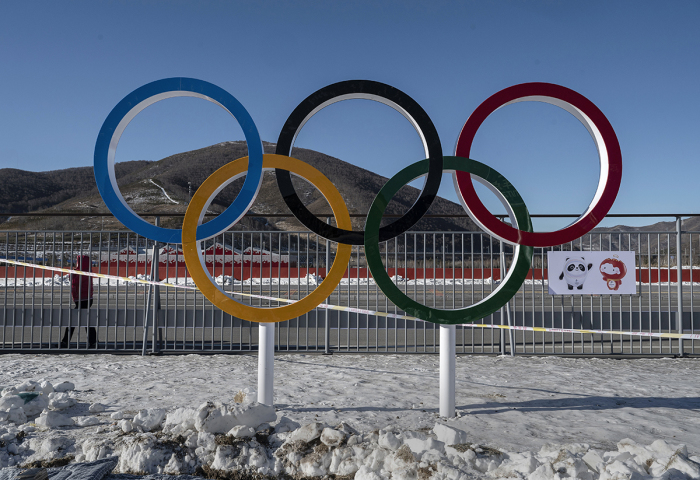Female athletes slam IOC's trans athlete participation guidelines as a 'disgrace'

The International Olympic Committee has revised its guidelines regarding trans-identified athletes' participation in the 2024 Summer Olympic Games in Paris, France, as debates about fairness in women’s sports continue.
The International Olympic Committee, which describes itself as “a catalyst for collaboration between all Olympic stakeholders” as well as “the guardian of the Olympic Games and the leader of the Olympic Movement,” released an updated position statement outlining its “framework on fairness, inclusion and non-discrimination on the basis of gender identity and sex variations.”
The framework, published in the British Journal of Sports Medicine on Friday, builds on a previous document unveiled last year ahead of the 2022 Winter Olympic Games in Beijing, China.
The updated document was crafted to “provide the international sports science and medicine community with an updated explanation of what the Framework is, how it aligns with existing scientific and medical knowledge and how it can usefully be put into practice across individual sports settings.” Specifically, the new guidelines outline the analysis behind the 10 principles established last year to advise individual countries on determining eligibility criteria for sports.
The principles behind the IOC framework include “inclusion,” the “prevention of harm,” “non-discrimination,” “fairness,” “no presumption of advantage,” an “evidence-based approach,” the “primacy of health and bodily autonomy,” a “stakeholder-centered approach,” a “right to privacy” and “periodic reviews.” Most of the principles in question contain non-binding resolutions advising individual countries on how to handle trans-identified athletes while giving individual sports leeway to implement their own rules governing the participation of such athletes.
The document cites the eligibility criteria for participation in the Australian Football League as a model for countries to follow when determining the eligibility of a trans-identified athlete to play on the team of their choice. The AFL considers the trans-identified athlete’s “height, weight, bench press and squat capabilities, 20 m sprint time, vertical jump, game-specific GPS data and 2 km run time” instead of solely relying on their testosterone level.
At the same time, the document’s section on fairness recognizes that “sports organizations may at times need to issue eligibility criteria for sex-segregated competition to maintain a fair and proportionate distribution of competitive advantages among participants” as well as the “particular importance of advancing equality for women in sport and preserving fair and meaningful competition for elite women athletes, which may require criteria that limits eligibility in some cases.”
Female athletes, many of whom have emerged as staunch opponents of allowing trans-identified males to directly compete against biological women, slammed the new IOC guidelines on social media. Sharron Davies, a retired British Olympic swimmer, took to Twitter to chastise the IOC as a “f***ing disgrace” while warning that female athletes will lose their sports if they do not protest.
Davies’ remarks came in response to two-time Olympic runner Mara Yamauchi’s concern about principle 8 of the framework, which “aims to ensure that sports bodies consider the perspectives and lived experiences of those who may be affected by the development and implementation of eligibility criteria.”
Highlighting how the guidelines identify “trans athletes and/or athletes with sex variations” as those “most directly impacted by eligibility criteria,” Yamauchi characterized the classification of trans-identified athletes as the primary stakeholders in the debate about athlete participation as a “total disregard for women and girls.” She suggested that the message conveyed by the document asserted that “we will DESTROY your sports, ladies, but you are so totally worthless we won’t bother asking your views.”
The updated IOC guidelines come as a debate about the participation of trans-identified athletes on sex-segregated sports teams that correspond with their stated gender identity as opposed to their biological sex has become a source of contention. Critics of such policies point to the physical differences between men and women as a factor giving biological males who identify as females an unfair advantage over their biologically female counterparts in women’s sports.
USA Powerlifting, which requires athletes to participate on sports teams that correspond with their biological sex, has noted that males have “increased body and muscle mass, bone density, bone structure, and connective tissue” that give them a competitive advantage over their biologically female counterparts in the competitive sport of powerlifting.
Additionally, a 2020 study published in the British Journal of Sports Medicine found that trans-identified male athletes continue to possess advantages over biologically female athletes after two years of taking feminizing hormones.
In the United States, concern about the impact of trans-identified athletes’ participation in women’s sports has prompted 18 states to pass laws requiring participants in athletics at the K-12 level, and in some cases at the collegiate level, to play on sports teams that correspond with their biological sex as opposed to their chosen gender identity.
The LGBT Movement Advancement Project, which opposes such legislation, has identified these states as Alabama, Arizona, Arkansas, Florida, Idaho, Indiana, Iowa, Kentucky, Louisiana, Mississippi, Montana, South Carolina, South Dakota, Tennessee, Texas, Utah, West Virginia and Wyoming.
Ryan Foley is a reporter for The Christian Post. He can be reached at: ryan.foley@christianpost.com





























